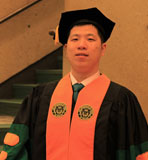SPS Webinar: 19 January 2023, presented by Dr. Fei Tao and Dr. Carlos Busso

Upcoming SPS Webinar!
Title: Advances on Multimodal Machine Learning Solutions for Speech Processing Tasks and Emotion Recognition
Date: 19 January 2023
Time: 1:00 PM Eastern (New York time)
Duration: Approximately 1 Hour
Presenters: Dr. Fei Tao and Dr. Carlos Busso
Based on the IEEE Xplore® article: End-to-End Audiovisual Speech Recognition System with Multitask Learning
Published: IEEE Transactions on Multimedia, February 2020, available in IEEE Xplore®
Download: The original article is available for download.

Abstract:
Biography:

Dr. Fei Tao received the B.S. degree in electrical engineering from Beijing Jiaotong University, Beijing (BJTU), Beijing, China, in 2009, the M.S. degree from Texas Southern University (TSU), Houston, TX, USA, and the Ph.D. degree from the University of Texas at Dallas, Richardson, TX, USA, in 2018.
He is currently a Senior Applied Scientist at Amazon Web Services (AWS) leading a team developing multimodal artificial intelligence/machine learning (AIML) models. His research interest is in multimodal machine learning, which involves audio, video, and text. He has worked on speech recognition, speaker verification, multimodal emotion recognition, multimodal active speaker detection, source separation, text-to-speech synthesis, music synthesis, and multimodal advertisement recommendation.
Dr. Tao has served as reviewer for academia, including top conference, ICMI, Interspeech, ICASSP, NAACL, ACL, EMNLP, AAAI, and top journals, like IEEE Transactions on Acoustics, Speech, and Signal Processing.

Dr. Carlos Busso received the B.S. and M.S. (hons.) degrees in electrical engineering from the University of Chile, Santiago, Chile, in 2000 and 2003, respectively, and the Ph.D. degree in electrical engineering from the University of Southern California (USC), Los Angeles, CA, USA, in 2008.
He is a Professor at the University of Texas at Dallas’s Electrical and Computer Engineering Department, where he is also the director of the Multimodal Signal Processing (MSP) Laboratory. His research interest is in human-centered multimodal machine intelligence and application, with focus on the broad areas of affective computing, multimodal human-machine interfaces, in-vehicle active safety system, and machine learning methods for multimodal processing. He has worked on audio-visual emotion recognition, analysis of emotional modulation in gestures and speech, designing realistic human-like virtual characters, and detection of driver distractions. His research group has received research funding from different agencies including the National Science Foundation (NSF), National Institutes of Health (NIH), Biometric Center of Excellence (BCOE), Semiconductor Research Corporation (SRC), and grants from industry (Samsung, Robert Bosch LLC, Microsoft, Honda Research Institute).
Dr. Busso is a recipient of an NSF CAREER Award. In 2014, he received the ICMI Ten-Year Technical Impact Award. In 2015, his student received the third prize IEEE ITSS Best Dissertation Award (N. Li). He also received the Hewlett Packard Best Paper Award at the IEEE ICME 2011 (with J. Jain), and the Best Paper Award at the AAAC ACII 2017 (with Yannakakis and Cowie). He received the Best of IEEE Transactions on Affective Computing Paper Collection in 2021 (with R. Lotfian) and the Best Paper Award from IEEE Transactions on Affective Computing in 2022 (with Yannakakis and Cowie). He is the co-author of the winning paper of the Classifier Sub-Challenge event at the Interspeech 2009 emotion challenge. He has served in chair positions for top conferences of the field including International conference on multimodal Interaction (ICMI), Interspeech, the IEEE International Conference on Multimedia & Expo (ICME), IEEE International Conference on Automatic Face and Gesture Recognition (FG), and AAAC Conference on Affective Computing and Intelligent Interaction. He has served as the general chair of ACII 2017 and ICMI 2021, and Program Chair of ICMI 2016, VCIP2017 and ASRU 2021. He is currently serving as an associate editor of the IEEE Transactions on Affective Computing. He is an IEEE Fellow. He is a member of the International Speech Communication Association (ISCA), and the Association for the Advancement of Affective Computing (AAAC), and a senior member of Association for Computing Machinery (ACM).

